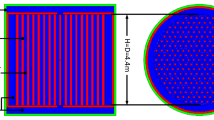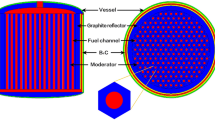Abstract
Heavy water-moderated molten salt reactors (HWMSRs) are novel molten salt reactors that adopt heavy water rather than graphite as the moderator while employing liquid fuel. Owing to the high moderating ratio of the heavy water moderator and the utilization of liquid fuel, HWMSRs can achieve a high neutron economy. In this study, a large-scale small modular HWMSR with a thermal power of 500 MWth was proposed and studied. The criticality of the core was evaluated using an in-house critical search calculation code (CSCC), which was developed based on Standardized Computer Analyses for Licensing Evaluation, version 6.1. The preliminary fuel cycle performances (initial conversion ratio (CR), initial fissile fuel loading mass, and temperature coefficient) were investigated by varying the lattice pitch (P) and the molten salt volume fraction (VF). The results demonstrate that the temperature coefficient can be negative over the range of investigated Ps and VFs for both 233U-Th and LEU-Th fuels. A core with a P of 20 cm and a VF of 20% is recommended for 233U-Th and LEU-Th fuels to achieve a high performance of initial CR and fuel loading. Regarding TRU-Th fuel, a core with a smaller P (~ 5 cm) and larger VF (~ 24%) is recommended to obtain a negative temperature coefficient.









Similar content being viewed by others
References
U.S. DOE. A technology roadmap for generation IV nuclear energy systems, Philos. Rev. 66(2), 239–241 (2002). https://doi.org/10.2172/859029
T. Abram, S. Ion, Generation-IV nuclear power: a review of the state of the science. Energy Policy 36(12), 4323–4330 (2008). https://doi.org/10.1016/j.enpol.2008.09.059
J. Serp, M. Allibert, O. Benes et al., The molten salt reactor (MSR) in generation IV: overview and perspectives. Prog. Nucl. Energy 77, 308–319 (2014). https://doi.org/10.1016/j.pnucene.2014.02.014
P.N. Haubenreich, J.R. Engel, Experience with the molten-salt reactor experiment. Nucl. Eng. Technol. 8(2), 118–136 (1970). https://doi.org/10.13182/NT8-2-118
M.W. Rosenthal, P.R. Kasten, R.B. Briggs, Molten-salt reactors—history, status, and potential. Nucl. Eng. Technol. 8(2), 107–117 (1970). https://doi.org/10.13182/NT70-A28619
H.G. MacPherson, The molten salt reactor adventure. Nucl. Sci. Eng. 90(4), 374–380 (1985). https://doi.org/10.13182/NSE90-374
M.E. Whatley, L.E. McNeese, W.L. Carter et al., Engineering development of the MSBR fuel recycle. Nucl. Eng. Technol. 8(2), 170–178 (1970). https://doi.org/10.13182/NT70-A28623
R. C. Robertson, Conceptual Design Study of a Single-Fluid Molten-Salt Breeder Reactor, United States, Technical Report, ORNL-4541 (1971). https://doi.org/10.2172/4030941
J. Krepel, U. Rohde et al., Dynamics of molten salt reactors. Nucl. Technol. 164(1), 34–44 (2008). https://doi.org/10.13182/NT08-A4006
A. Nuttin, D. Heuer, A. Billebaud et al., Potential of thorium molten salt reactors detailed calculations and concept evolution with a view to large scale energy production. Prog. Nucl. Energy 46(1), 77–99 (2005). https://doi.org/10.1016/j.pnucene.2004.11.001
L. Mathieu, D. Heuer, R. Brissot et al., The thorium molten salt reactor: moving on from the MSBR. Prog. Nucl. Energy. 48(7), 664–679 (2006). https://doi.org/10.1016/j.pnucene.2006.07.005
L. Mathieu, D. Heuer, E. Merle-Lucotte et al., Possible configurations for the thorium molten salt reactor and advantages of the fast nonmoderated version. Nucl. Sci. Eng. 161(1), 78–89 (2009). https://doi.org/10.13182/NSE07-49
G.C. Li, Y. Zou, C.G. Yu et al., Model optimization and analysis of Th-U breeding based on MSFR. Nucl. Tech. 40(2), 020603 (2017). https://doi.org/10.11889/j.0253-3219.2017.hjs.40.020603(in Chinese)
D.G. Li, G.M. Liu, Analysis of Th-U breeding in molten salt fast reactor. Nucl. Tech. 43(5), 050604 (2020). https://doi.org/10.11889/j.0253-3219.2020.hjs.43.050604(in Chinese)
J. Zhou, J.G. Chen, C.G. Yu et al., Influence of 7Li enrichment in FLi/FLiBe on Th-U conversion performance. Nucl. Tech. 42(11), 110601. https://doi.org/10.11889/j.0253-3219.2019.hjs.42.110601(in Chinese)
J. H. Wu, J. G. Chen J, X. Z. Kang et al. A novel concept for a molten salt reactor moderated by heavy water, Ann. Nucl. Energy 132, 391–403 (2019). https://doi.org/10.1016/j.anucene.2019.04.043
S. Delpech, E. Merle-Lucotte, D. Heuer et al., Reactor physic and reprocessing scheme for innovative molten salt reactor system. J. Fluorine Chem. 130(1), 11–17 (2009). https://doi.org/10.1016/j.jfluchem.2008.07.009
V. Ignatiev, O. Feynberg, I. Gnidoi et al., Molten salt actinide recycler and transforming system without and with Th–U support: Fuel cycle flexibility and key material properties. Ann. Nucl. Energy 64, 408–420 (2014). https://doi.org/10.1016/j.anucene.2013.09.004
R.J. Sheu, C.H. Chang, C.C. Chao et al., Depletion analysis on long-term operation of the conceptual Molten Salt Actinide Recycler & Transmuter (MOSART) by using a special sequence based on SCALE6/TRITON. Ann. Nucl. Energy 53, 1–8 (2013). https://doi.org/10.1016/j.anucene.2012.10.017
V. Nian, J. Bauly, Nuclear Power Developments: Could small modular reactor power plants be a "game changer"? - The ASEAN perspective, ICAE2014, 61, 17–20 (2014). https://doi.org/10.1016/j.egypro.2014.11.895
H.R. Trellue, R.J. Kapernick, D.V. Rao et al., Salt-cooled modular innovative thorium heavy water-moderated reactor system. Nucl. Technol. 182(1), 26–38 (2012). https://doi.org/10.13182/NT13-A15823
K. Sasaki, T. Terai, A. Suzuki et al., Effect of the Y2O3 Concentration in YSZ on the thermophysical property as a thermal shielding material. Int. J. Appl. Ceram. Technol. 7(4), 518–527 (2010). https://doi.org/10.1111/j.1744-7402.2009.02363.x
J.Y. Park, SiCf/SiC composites as core materials for Generation IV nuclear reactors. Struct. Mater. Gener. IV Nucl. React 106, 441–470 (2017). https://doi.org/10.1016/B978-0-08-100906-2.00012-4
R. Scarlat, M. Laufer, E. Blandford et al., Design and licensing strategies for the fluoride-salt-cooled, high-temperature reactor (FHR) technology. Prog. Nucl. Energy 77, 406–420 (2014). https://doi.org/10.1016/j.pnucene.2014.07.002
G.C. Li, Y. Zou, C.G. Yu et al., Influences of Li-7 enrichment on Th-U fuel breeding for an Improved Molten Salt Fast Reactor (IMSFR). Nucl. Sci. Tech. 28(7), 97 (2017). https://doi.org/10.1007/s41365-017-0250-7
C.Y. Zou, C.Z. Cai, C.G. Yu et al., Transition to thorium fuel cycle for TMSR. Nucl. Eng. Des. 330, 420–428 (2018). https://doi.org/10.1016/j.nucengdes.2018.01.033
J. Duderstadt, L. Hamilton, Nuclear Reactor Analysis (Wiley, Hoboken, 1976)
X.X. Li, D.Y. Cui, Y.W. Ma et al., Influence of 235U enrichment on the moderator temperature coefficient of reactivity in a graphite-moderated molten salt reactor. Nucl. Sci. Tech. 30(11), 166 (2019). https://doi.org/10.1007/s41365-019-0694-z
X.C. Zhao, D.Y. Cui, X.Z. Cai et al., Analysis of Th-U breeding capability for an accelerator-driven subcritical molten salt reactor. Nucl. Sci. Tech. 29, 121 (2018). https://doi.org/10.1007/s41365-018-0448-3
L.Y. He, S.P. Xia, R. Yan et al., Th-U and U-Pu cycling performances of molten chloride salt fast reactor under LEU start-up mode. Nucl. Tech. 43(1), 010604 (2020). https://doi.org/10.11889/j.0253-3219.2020.hjs.43.010604(in Chinese)
G.C. Li, P. Cong, C.G. Yu et al., Optimization of Th-U fuel breeding based on a single-fluid double-zone thorium molten salt reactor. Prog. Nucl. Energy 108, 144–151 (2018). https://doi.org/10.1016/j.pnucene.2018.04.017
X.X. Li, Y.W. Ma, C.G. Yu et al., Effects of fuel salt composition on fuel salt temperature coefficient (FSTC) for an under-moderated molten salt reactor (MSR). Nucl. Sci. Tech. 29(8), 110 (2018). https://doi.org/10.1007/s41365-018-0458-1
Author information
Authors and Affiliations
Corresponding authors
Additional information
Publisher's Note
Springer Nature remains neutral with regard to jurisdictional claims in published maps and institutional affiliations.
This work was supported by the Chinese TMSR Strategic Pioneer Science and Technology Project (No. XDA02010000), the National Natural Science Foundation of China (No. 11905285), the Frontier Science Key Program of the Chinese Academy of Sciences (No. QYZDY-SSW-JSC016), and the National Natural Science Foundation of China (No. 11790321).
Rights and permissions
About this article
Cite this article
Zhang, YP., Ma, YW., Wu, JH. et al. Preliminary analysis of fuel cycle performance for a small modular heavy water-moderated thorium molten salt reactor. NUCL SCI TECH 31, 108 (2020). https://doi.org/10.1007/s41365-020-00823-5
Received:
Revised:
Accepted:
Published:
DOI: https://doi.org/10.1007/s41365-020-00823-5




